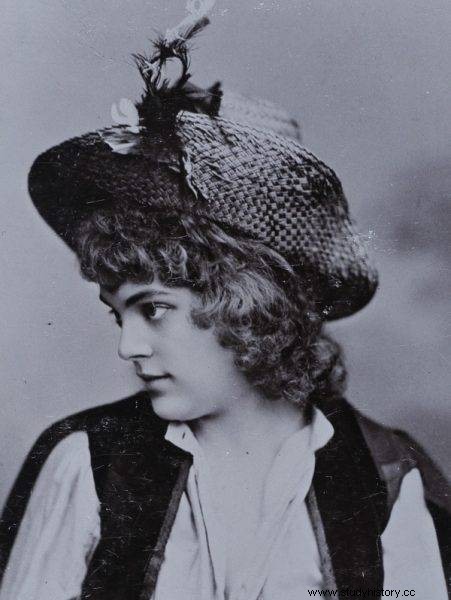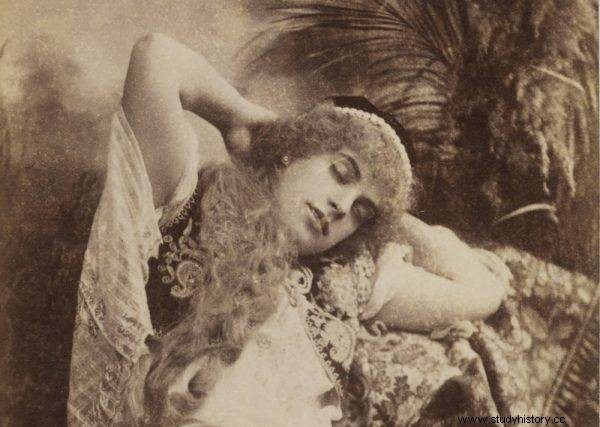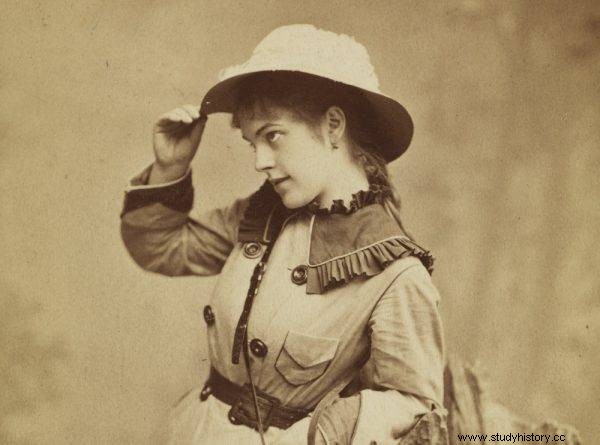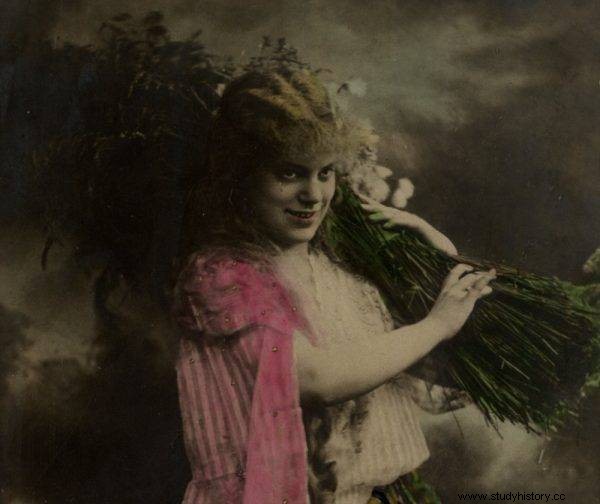On July 1, 1890, Warsaw was shocked by the death of a popular actress - Maria Wisnowska, a lover and seducer. Her killer turned out to be her lover ...
At 5:30 in the morning, the Bartenev cornet entered the barracks of the unit and headed for the commander of Alexander Likhachev. He put himself at the disposal of a senior officer, took off the epaulets and said:- I killed Mania .
Likhachev entered the actress's apartment, assisted by a janitor and policemen. He found Maria Wisnowska's corpse in a pool of blood. A farewell letter was lying next to the woman:
This man will act justly by killing me (…). I say goodbye to my beloved, holy mother and Alexander (...), I feel sorry for life and the theater ... Poor mother, unhappy, I do not ask for forgiveness since I am not dying of my own free will (...). Mom, I'll see you up there. I can feel it at the last minute. Don't play with love!
Warszawska femme fatale
Maria Wisnowska was the undisputed star of the scene at that time. She combined innocence and corruption, which attracted men (especially pupils and students) watching shows with her participation. Posing for photos, her lips parted and her eyes widened. There was something defiant about her look and gentle at the same time.

As she posed for photos, her lips parted and her eyes widened. There was something defiant and gentle about her gaze.
Journalists and admirers were welcomed in a boudoir upholstered in pink cloth, decorated with flowers and oriental furniture. She was lying on the ottoman, bare legs exposed. When she wanted to win the man's favor, she invited him to her place, sat down close, grabbed his hand and looked into his eyes deeply, convinced that he must fall in love with her.
She loved making men fall in love with each other, playing with their feelings and watching them suffer.
Read also:The first orgasm in the history of cinema. The 1933 film "Ecstasy" caused a scandal
Suicidal thoughts
When she played in Lviv at the beginning of her acting career, the director of the local theater, 60-year-old Jan Dobrzański, wanted to divorce his wife for her after twenty-five years of a successful marriage. She got into an affair with Count Alfred Potocki, a Galician politician and a fabulous rich man, and then abandoned him.
The opera singer Aleksander Myszuga even broke up with his wife because of Wisnowska, who recently gave birth to him a child, but in the meantime the actress lost interest in him.

Even as a very young girl, she was fascinated by the themes of death and passing away. She liked to see dead bodies, she was interested in suicides.
Even as a very young girl, she was fascinated by the themes of death and passing away. She liked to see dead bodies, she was interested in suicides . One evening she offered to poison a journalist who was in love with her together. Similar situations happened often, and the men did not know if Wisnowska really wanted to kill herself or if she was just playing another role.
Read also:What did the greatest actresses have to sacrifice for fame?
Deadly romance
Aleksander Bartieniew came from a Russian noble family, he served in the elite Grodno leybguard regiment, which had been stationed in Warsaw for years. The unit's barracks were located in Łazienki Park.
The acquaintance of the artist and Bartenev began in February 1889. At first, the officer - a shy and shy man - acted restrainedly towards Maria, only sending her flowers . Their relationship developed slowly and it was only consumed three months before the actress was killed.
The Russian took this acquaintance seriously and hoped that he would be the only man in his beloved's life. However, this did not happen. After the murder of the artist, the head of the investigative department of the Warsaw prosecutor's office, Baron von Raden, wrote in the indictment:
Bartenev was not entirely happy, however. Great stage success, beautiful exterior and strongly developed coquetry by Wisnowska attracted men to her , and their visit to their beloved woman made Bartenev feel jealous.
Read also:They taught Polish women how to dress. Pre-war fashion icons
Love murder
Wisnowska tormented and provoked the officer. She suggested that they must commit suicide together. She asked if he would be able to kill her before taking his own life. Barteniew denied it.
During one dinner, Wisnowska confessed to the cornet that she dreams of dying on stage in front of the audience . A lover would shoot her when handing flowers at the end of the show, then bite the poison capsule and die next to her.

During one dinner, Wisnowska confessed to the cornet that she dreams of dying on stage in front of the audience.
The actress also confided to him about her visions, in which the devil appeared in the form of a man with a bleeding wound on his face.
The unlucky night, Wisnowska took up the topic of joint suicide again. The lovers ate cherries and drank champagne mixed with opium. At one point, Maria said that they had nothing left but death.
Half-conscious from alcohol and opium, lovers wrote farewell letters. Wisnowska put a handkerchief soaked in chloroform on her face, repeating repeatedly:"If you love me, kill me". The officer hugged her, kissed her, and fired the revolver pressed against her left breast. Maria died immediately.
Process
The cornet family hired one of the most eminent Russian lawyers - Fyodor Plewako, an orator who won the hopeless trials. The trial was held in Warsaw and aroused great interest among the city's inhabitants.
Plewako did not deny that the officer killed the actress. The lawyer based his line of defense on portraying Bartienew as a victim of a clever manipulator.

Wisnowska's personality was "a hellish mixture of the characters she played". She could be a "coquette, dreamer and schemer" at the same time.
First of all, according to Plewaka Wisnowska's personality was "a hellish mixture of the characters she played" . She could be "a coquette, a dreamer and an intriguer" at the same time. As a result, Barteniew did not know whether he had the real Maria in front of him or a jumble of characters played by her. Apparently, the officer could not understand that the talks about death conducted by the actress were a game. Secondly, for him the relationship with the artist was not a passing love.
At the same time, the lawyer claimed that Wisnowska herself was a victim of the artistic milieu which required her to dazzle, surprise and stand out. That's why she got carried away by the game and got Barteniev into it.
The officer was sentenced to 8 years of hard labor. Emperor Alexander III converted the sentence to 8 years of military service in the rank of private.
Also read:Did love really "forgive her everything"? The story of Hanka Ordonówna
Barteniew's spirit
The murder of Wisnowska had an echo in Russia as well. Julij Yelec, Barteniew's regimental colleague, wrote the novel "Disease of the Age", based on the romance of the actress and the officer, as well as the murder and the trial. The book sold out like hot cakes.
In 1925, the Nobel laureate, Ivan Bunin, wrote the novel The Case of the Cornet of Yelagin, based on the files of the Warsaw trial published in St. Petersburg. In 2003, a film based on the murder theme, "Igra w modern" was made - but it was not well received.
And how was the fate of Aleksander Barteniew? There is no data on this. Apparently his ghost appears once a year in Powązki, where Wisnowska is buried, and places a red rose on her grave.
